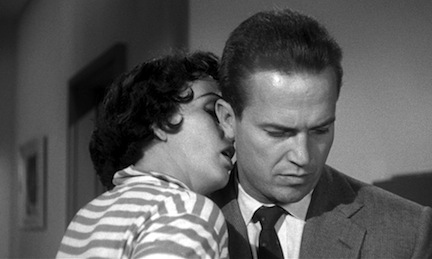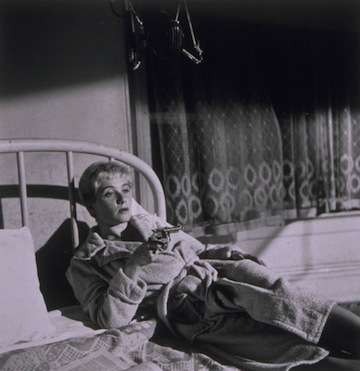KISS ME DEADLY CRITERION DVD
 Monday, November 21, 2011 at 07:17PM
Monday, November 21, 2011 at 07:17PM  A bull looking for a china shop. Courtesy Criterion ProductionsMike Hammer, as portrayed by Ralph Meeker, is Noir’s ultimate blunt object. For Mike, thinking causes confusion, but action always provides a solution, no matter how destructive. If Mike can’t punch it, break it, drive it, sell it, shoot it or fuck it, he’s not interested; Mike’s a pure American male.
A bull looking for a china shop. Courtesy Criterion ProductionsMike Hammer, as portrayed by Ralph Meeker, is Noir’s ultimate blunt object. For Mike, thinking causes confusion, but action always provides a solution, no matter how destructive. If Mike can’t punch it, break it, drive it, sell it, shoot it or fuck it, he’s not interested; Mike’s a pure American male.
Robert Aldrich’s direction and A.I. Bezzerides’ screenplay transposes Mickey Spillane’s private eye to the screen as brutal, simple-minded, heedless and atavistic, driven by an American’s adolescent fixation with girls, gizmos and guns. Mike enjoys himself, but his antics exact a high price: the end of the world.
Careening home in his sports car one night, Hammer almost mows down a desperate hitchhiker. She’s escaped from a nearby asylum, but not for long. Her pursuers run Mike’s car off the road and leave him to die in the wreckage. Half-conscious, he hears the screaming hitchhiker being tortured to death. With the help of his dedicated - if masochistic - secretary, Vilma, Mike tracks down the killers. Unknown gangsters plant bombs in his car; strange women offer themselves; a sinister secret is somehow contained in a too-warm, glowing, growling leather-bound box: the ‘Great Whatsit’ that everyone kills to attain, and the inspiration for the glowing briefcase in Pulp Fiction. The story tears along. Aldrich distracts us, and Hammer, from his violent quest with cool cars, sharp suits, stellar babes and bachelor-pad oddities, like a primitive reel-to-reel phone answering machine.
Meeker’s character’s an amoral pig, which he freely admits. His contempt for the world is genuine and crippling. His personality makes him unfit for any profession but private eye. That is, he’s lazy, sadistic, likes spying on people and feels morally superior. And in this universe, Hammer’s the hero.
The repellent, charming destructive energy that fuels Hammer is reflected in the world around him. Everyone grabs what they want with no sense of consequences. Because Aldrich, like Hammer, is neither a poet nor a deep thinker - like Hammer, he’s a hard-ass, if occasionally discursive, problem-solver - Kiss Me is unusually satisfying as both a tough-minded, cautionary sleigh-ride of thrills and a cold-hearted metaphor for the breakdown of society.
With her androgynous haircut, languorous sexuality, little-girl voice and constantly shifting loyalties, Gaby Gaby at her most lucid. Courtesy Criterion Productions Rodgers provides a fitting coda to fifteen years of duplicitous Noir femmes fatale. She incarnates a singular, dissolute, randomly horny and utterly relaxed ruthlessness. Her identity changes according to the company she keeps, her social role alters as her ambition takes root, her ambitions grow as she learns the extent of her sexual power and her sexual power breeds suicidal megalomania. If Gaby Rodgers herself - Gaby the person, not her character - was in fact neither insane nor distracted to the point of schizophrenia, then her performance is one for the ages.
Gaby at her most lucid. Courtesy Criterion Productions Rodgers provides a fitting coda to fifteen years of duplicitous Noir femmes fatale. She incarnates a singular, dissolute, randomly horny and utterly relaxed ruthlessness. Her identity changes according to the company she keeps, her social role alters as her ambition takes root, her ambitions grow as she learns the extent of her sexual power and her sexual power breeds suicidal megalomania. If Gaby Rodgers herself - Gaby the person, not her character - was in fact neither insane nor distracted to the point of schizophrenia, then her performance is one for the ages.
This is a very different entertainment than the A-picture, Hollywood slickness of Double Indemnity or The Killers. In most noir, the hero’s loss of innocent is represented as a loss of faith, a calamitous acquiring of cynicism springing from tragic death, broken hearts or dashed expectations. Hammer never had any faith to begin with; he’s just a nasty guy. His comeuppance consists of learning how just how ruthless, brutal, greedy and destructive his enemies can be. And all this time he thought he was the toughest monkey in the urban jungle...
It’s an alienated, debased portrait, and a visceral prophesy. Robert Aldrich’s nihilism is boundless; he’s determined not only to kill everyone in the story, but also to bring an end to the romanticization of cynicism, violence and self-made morality that comprises Noir. He succeeds as Sam Pecinpah did with The Wild Bunch, by so raising the stakes that no one could possibly follow.
Criterion’s extras include a short, revealing excerpt from a documentary about screenwriter A. I. Bezzerides, who also wrote Nicholas Ray’s On Dangerous Ground. Bezzerides says flat out that the speed with which he wrote the screenplay reflects the depth of his contempt for the novel. Bezzerides chucked Spillane’s ideas and changed everything from the locale to the McGuffin. Director Alex Cox (Repo Man, Fear and Loathing in Las Vegas), hilariously deadpan as ever, also trashes the book and Spillane’s aggressive simple-mindedness. Spillane – who sold 24 million Mike Hammer books in the early ‘50’s alone - appears in the Bezzerides’ documentary to express his baffled distaste for the film. Unsurprisingly, he has no clue how utterly he’s been outmaneuvered and rendered obsolete. Bezzerides and Aldrich found the themes of Spillane’s novel repulsive, and Kiss Me – shot in 22 days! - is their savage rejoinder. Criterion also includes a self-serving doc on Spillane, who is nothing if not self-serving. After watching considerably more sophisticated men trash him, Spillane’s confidence in his own Neanderthal vision and methods ought to be a little sad. In fact, just like the film, it’s funny as hell.
© 2011 David N Meyer
 Aldrich,
Aldrich,  Criterion,
Criterion,  Gaby Rogers,
Gaby Rogers,  Kiss Me Deadly,
Kiss Me Deadly,  Meeker,
Meeker,  Pecinpah,
Pecinpah,  Pulp Fiction,
Pulp Fiction,  Tarantino
Tarantino 
